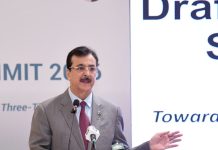By Ali Imran
ISLAMABAD: Federal Minister for Science and Technology, Shibli Faraz Tuesday urged the universities to play their part in science and knowledge diplomacy.
He was addressing at an international webinar on the “Role of Science and Technology Universities in Promoting National High-Tech Growth†at National University of Science and Technology (NUST).
He stated that universities were helping shift the focus of the world slowly but gradually from geopolitical competition to knowledge-based cooperation. In today’s world, there is an urgent need to promote peace-enhancing diplomacy rather than diplomacy driven by war and conflict,†he added.
Shibli Faraz said that the government was keenly aware that long-term growth of the country depended on successful development of national systems of innovation and a mature knowledge economy based on a favourable economic and institutional regime, high-quality human resource development, multi-type innovation driven by science and technology, and promotion and utilisation of advanced information and communications technologies.
Chairman Prime Minister’s Task Force on Science and Technology, Dr Atta-ur-Rahman, shared his vision for improving the Science and Technology (S&T) landscape of the country. He said that innovation was transforming economies and a comprehensive S&T-based apparatus was a crucial determinant of long-run growth, competitive edge, and economic autarky of a state.
He stated that universities served as the critical nodes of new growth through their inherent diversity, dynamism and the unmatched ability to introduce new ideas and talent. Their key performance indicators must be the promotion of policy research and technological evolution of the production function of industry.
The process may comprise scientific research, foresight exercises, and networking, combined with the direct and indirect facilitation of new industrial clusters like business and technology incubators, science and technology parks, high technology zones, and innovation areas.
Pro-Vice-Chancellor Research and Innovation at the University of Surrey, UK, Professor David Sampson highlighted the crucial role of universities in national development.
While narrating several innovative success stories of the past and the achievements of his own institute, he underscored the significance of industry-academia linkages; production, encouragement and cultivation of top talent; emphasis on teamwork; and rational management of openness and secrecy issue of research. He hoped that Pakistan utilised its vast and raw human resource through greater focus and spending in S&T-based pursuits.
Air Vice Marshal (Retd) Dr Rizwan Riaz, Pro-Rector Research, Innovation and Commercialisation at NUST, stressed the need for leveraging all channels of science and technology for high-tech national growth. Pakistan, in his view, is full of talent that should be nurtured and encouraged through better opportunities.
Problems such as brain drain, bureaucratic hurdles, and restricted import of tech-based goods and technologies should be addressed. He also pointed out the responsibility of the global north for development of tech- and R&D-based human resources to ensure collective gains.
Dr Malcolm Parry OBE, pointed out that in terms of capacity, the global population of university graduates was expected to nearly double over this decade and reach 300 million by 2030.
The levels of global investment in R&D tripled from $676 billion in 2000 to $2.0 trillion in 2018. Although the government is a major funder of research in many countries, it tends to be a minor performer in undertaking research. He said national and international policy decisions sit at the heart of the win-win model for science and technology.
Outputs of the process can be anyways translated into commercial success by stimulating and supporting entrepreneurship among young people that pass through universities and help them create or find worthwhile employment by connecting science that includes Engineering, Technology, and Social Science, to a market.
He said that the role for scientific knowledge translators – including policymakers, analysts, engineers, business entrepreneurs, and sometimes scientists themselves – was crucial if their advances were to improve welfare. This needs to be supported with policies that encourage investment and help drive technology entrepreneurship.





